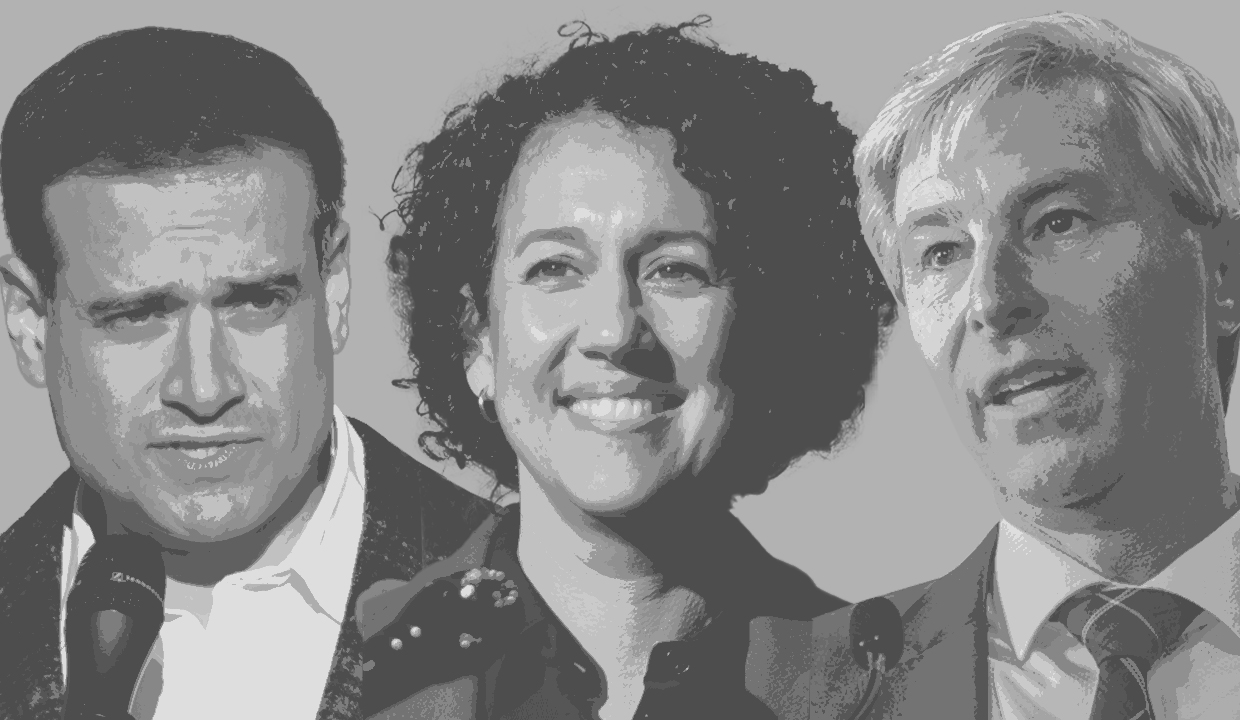Nova Scotia Premier Tim Houston is seeking a second term for his Progressive Conservative government. As PC MLA for Pictou East since 2013, Houston has led the PC Party since 2018 and has been premier since 2021, when his party won an upset victory with 31 of 55 seats in the legislature on a platform of fixing healthcare. In 2021, the PCs were trailing by as much as 28 points just two months before the election, coming from behind to win a majority.
The PCs face the Nova Scotia Liberal Party, led by Zach Churchill, and the NDP, led by Claudia Chender. Since the 2021 election when the PCs brought down the Liberal government, they have maintained a sizable lead over the other two major parties. The PC lead has been mostly in the double digits for more than a year. In the most recent public poll (sample taken October 28-29), the support levels were 38% for the PCs, 29% for the NDP, 26% for the Liberals and the Greens with 5%.
All but one of the six NDP MLAs represent districts in the Halifax Regional Municipality. The only non-HRM district the party holds is Cape Breton Centre – Whitney Pier – a district NDP MLA Kendra Coombs narrowly retained with just 1.5 percentage points over the challenging Liberal in 2021. It’s a district to watch in the 2024 campaign.
The 14 incumbent Liberal MLAs are also mostly in HRM, but some also represent parts of Industrial Cape Breton, the Valley and the South Shore. The Liberals will face two fronts – a battle with the NDP for dominance in Halifax and Industrial Cape Breton as well as a push in the province’s rural mainland where the PCs are strongest. The former Liberal Caucus Chair, Northside – Westmount MLA Fred Tilley, crossed the floor to the PCs on the Tuesday prior to the election call.
Key issues
The 2021, the PC campaign was laser-focused on fixing healthcare. Tim Houston capitalized on mounting frustration and disillusionment with a Liberal government that was approaching a decade in power at the time. Houston pulled the PC party more to the centre, promising hundreds of millions in new spending – more than 80% of which was dedicated to healthcare improvements. These included building 2,500 new single long-term care beds, offering improved access to universal mental health services, and attracting more doctors. There has also been interest in using technology and innovation to create more capacity and service access.
Much like in New Brunswick, Nova Scotia’s election will see the incumbent government pointing to its actions on healthcare and the opposition parties disputing that record. Earlier last week, the provincial government mailed to all Nova Scotia households a document titled “More Care Faster” (A slogan frequently used by Premier Houston), chronicling progress on healthcare since 2021. Both the NDP and Liberal leaders pounced on the timing of this mailout.
Cost of living is another major issue that will be framed differently by each party. Tim Houston has emphasized the Trudeau Liberal government’s role in worsening the day-to-day cost of living with the carbon tax and related measures. The NDP are pushing to establish rent control and provide a tax credit for renters from low- and middle-income households, and the Liberals promise free public transit and a two-point cut in the HST. The PCs announced in recent days their own 1-point HST cut, but also draw the discussion back to federal Liberal policies and taxes.
The Nova Scotia PCs would very much like to frame this snap election similarly to the current federal dynamic in the Atlantic Region. Support for the Liberal Party of Canada has plummeted in Atlantic Canada since the last federal election, dropping by 15 points on average. Conservative support has increased by a similar amount. Throughout the region, provincial Progressive Conservative leaders have called for the abolition of the federal carbon tax and provincial Liberal leaders, including Churchill in Nova Scotia, have distanced themselves from the federal party and the carbon tax. One notable difference in Nova Scotia is that Tim Houston is also careful to state that he is not a member of any federal political party. This is likely a function of managing a coalition he has built pulling the PC Party more to the left with significant spending promises.
The Houston government has also taken a hard stance on the status of the work related to the preservation/protection of the Chignecto Isthmus connecting New Brunswick and Nova Scotia. As it sees $35 billion in travelling through the area, Nova Scotia has taken the matter to court, arguing the project should be 100% federal responsibility, citing examples like Champlain Bridge in Montreal where the federal government assumed the full cost.
The early election call itself is an issue the Liberals and NDP are trying to stoke in their early statements and releases. In 2021, the PCs introduced a fixed election date of July 15, 2025 only to push that aside with this snap election call. Houston cited the need to seek a mandate on new investments on affordability and housing as well as the need to avoid a conflict with a looming federal election. Early election calls present risks for incumbent governments, though at some point their opponents usually have to move on if there’s no traction in complaining about it.
N.S. election key dates
- October 27: Writs issued and official campaign begins
- October 30: Early voting opens at district returning offices. Continues throughout writ period prior to election day.
- November 6: Deadline for nomination of candidates
- November 16: Application deadline for write-in ballot
- November 26: ELECTION DAY & deadline for receipt of write-in ballots
For more insights on the Nova Scotia election, connect with Senior Consultant Liam O’Brien.
